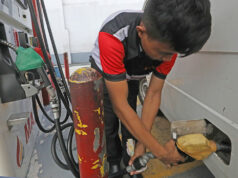
THE PHILIPPINES needs to expand agricultural exports to Europe, with a particular focus on coffee, to bolster its trade position in the face of the new US tariff regime, the head of the House trade committee said.
In an interview, Iloilo Rep. Ferjenel G. Biron said the government should push for more European trade in farm products to cushion the impact of the Trump tariffs.
“We should select commodities that we can efficiently export and that have economies of scale, so the impact of tariffs on us is minimized,” according to Mr. Biron. “Agriculture, specifically coffee… I think that is an area where we can truly compete.”
Southeast Asia is bracing for the impact of the US reciprocal tariffs, which have been paused until July. Six ASEAN countries are facing tariffs of between 32% and 49%. The Philippines has been assigned a 17% tariff, the second lowest in the region.
Mr. Biron said Philippine food and agricultural produce may face “tougher” market competition in Asia, noting that competitors can offer trade “cheaper” products.
His assessment appears to run counter to the message of President Ferdinand R. Marcos, Jr., who last week called for deeper economic ties with Southeast Asia to help mitigate the impact of the US tariffs. At the ASEAN summit in Kuala Lumpur, he urged his fellow leaders to “sell in each other’s markets.”
“It would be challenging for us to compete in the Asian market,” Mr. Biron said.
“If you’re focusing on food exports, Europe and America offer better premium pricing,” he said. “In Asia, competition is tougher because there are more affordable sources of processed food, like Vietnam, Cambodia and Thailand.”
The Philippines exported $1.53 billion worth of agricultural goods to the European Union last year, accounting for 19% of agricultural exports, according to government data.
“The idea of targeting western markets for agricultural exports such as coffee and processed food is strategically sound in principle,” John Paolo R. Rivera, a senior research fellow at the Philippine Institute for Development Studies, said via Viber.
“Coffee and niche food products can find high-value segments abroad,” he said, but noted the need for producers to improve quality to meet stricter regulations in western markets.
Exporting to developed countries may mean strengthening our product standards, and also our logistical support for producers as western markets are farther than our regional neighbors, Philip Arnold P. Tuaño, dean of the Ateneo School of Government, said via Facebook Messenger.
“Mitigating the effects of US tariffs may mean bolstering our exports to other markets by improving our food safety and marketing,” he added.
Mr. Rivera said legislators should look at drafting laws to help diversify Philippine exports by incentivizing companies that comply with logistics and food processing standards in developed countries. — Kenneth Christiane L. Basilio



